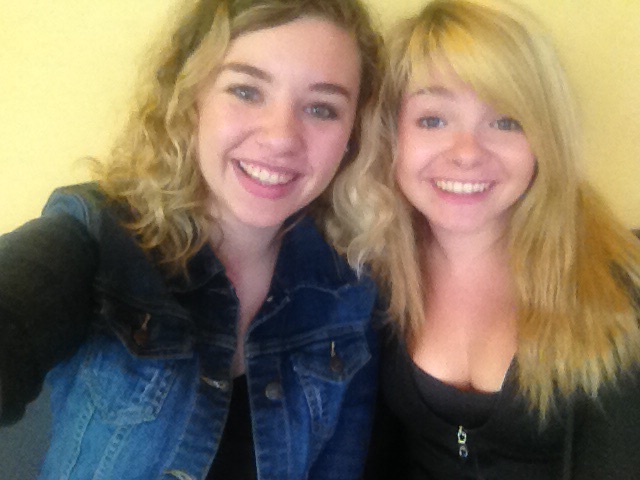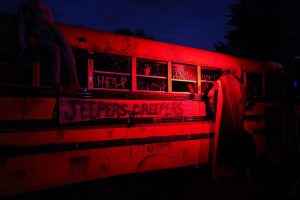Folkers cope with loss, strive to help other addicts and their families
April 18, 2016
Above: Senior Lauren Folker and her sister Kathrine share a happy moment. “My [family] went to Mexico- we went to Cancun. Kathrine and I just hung out the whole time, and I think that’s my favorite memory of her,” Folker said. “We went out, and we would dance, and we just made a bunch of friends.
When senior Lauren Folker’s sister Kathrine, died of a heroin overdose in August, 2015, she and her mother decided to help others who are battling heroin addictions.
One of 10 people who died in Fauquier County of a heroin overdose in 2015, Kathrine began experimenting with alcohol and pills, like Molly, in high school. After graduation she went into a 30-day sober living facility.
“In March of 2015 Kathrine felt that she was ready to go out on her own, but she quickly relapsed with alcohol, pills, and then heroin, which she never had before,” Kathrine’s mother Caroline Folker said. “Then she voluntarily went into rehab for two weeks in July, then relapsed. She knew she had a big problem. In her words, she was in hell. By August, she was dead; it was a very quick battle.”
Alumnus Ryan Perry spoke at Kathrine’s funeral; he said that her smile and friendliness had a big impact.
“Every time I saw her, she treated me like we had been best friends for years,” Perry said. “She was one of those rare people who was constantly positive. We an keep her with us by being like that to others.”
Since her sister lived in Winchester during the addiction process, Lauren didn’t witness Kathrine’s struggle first hand.
“It was hard hearing about it; we would usually keep the conversation light and easy,” Lauren said. “Kathrine loved everybody; that was really admirable. If you needed anything, she was there, and she was so genuinely nice to people.”
Caroline created a group to educate and give support to addicts and their families. The group meets on the first and third Thursday of every month at the Fauquier Hospital. It has helped give Caroline closure on her daughter’s death.
“We discovered there was a huge [number] of people who needed to get information quickly and couldn’t,” Caroline said. “I decided to create a support group called Families Overcoming Drug Addiction, so families who were going through what we were have a place to go to.”
Recovering addicts attend the meetings to tell their stories and speak to addicts and their families about the choices they’ve made, the recovery program and what recovery could look like.
“We have a total of 30 people who come,” Lauren said. “We get into a big circle and just discuss what we’ve been through; a lot of people there are where we were a few years ago. We give emotional support and have all become very close.”
Caroline and Lauren are certified in giving Narcan, an opiate antidote, to those who have overdosed on heroin and prescription opiates.
“It’s really important for families with drug addicts in their home to have the ability to save a life very quickly,” Caroline said. “Also, at the end of April I’m going to try to get certified to become a recovery coach and to help families on making decisions [for their loved ones].”
According to Lauren, the best way to support someone going through an addiction is to be there for them.
“You can see them at their worst moments, and you just need to love them through it and do whatever they need you to do. It’s definitely made me a stronger person. I’ve learned more about addiction, heroin in particular,” Lauren said. “I’ve gotten close to some people who are struggling and have learned what to say and how to help them.”
The use of heroin has doubled since 2007 and heroin-related deaths have tripled between 2010 to 2013, according to a report by the Centers for Disease Control and Prevention. The heroin epidemic affects people of all ages, races and backgrounds. School Resource Officer Lieutenant Sal Torelli said that being educated is the best way for students and parents to be aware of the dangers of heroin and its addictive qualities.
“We’re doing everything we can to combat this problem. We know that locking [users] up isn’t going to solve this [epidemic]. We can’t arrest our way out of this; we need treatments,” Torelli said. “Enforcement has stepped up quite a bit, and there are numerous different programs out there that are helping addicts. If we save one life, I’m happy; one life lost from heroin is too much.”
Lauren says that outsiders watching someone go through the addiction process should be empathetic to addicts and realize that addiction is a disease.
“It’s not [the addict’s] fault, and it doesn’t make them a bad person. If you’re going through it, there is hope,” Lauren said. “[The whole situation] definitely brought us all close together and made us realize that family is most important.”







